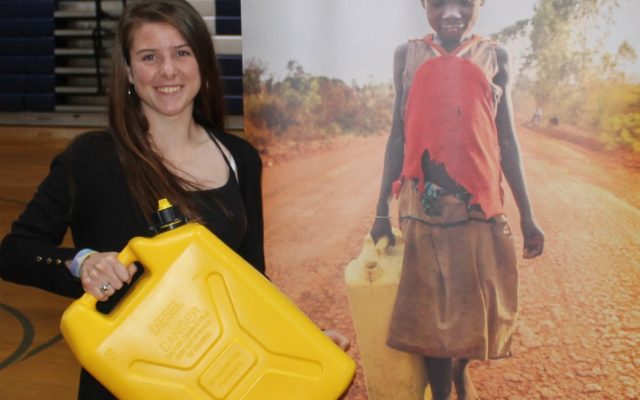
Penquis Key Club working to provide safe water for African village
MILO — Many people in the developed world take for granted access to clean, safe drinking water, all they need to do is turn on a nearby facet or take the top off a bottle. In other nations, the process to get water involves walking for hours and then the source may be contaminated with dangerous bacteria and parasites that can lead to sickness and even death.
The Penquis Valley High School Key Club is working to change this situation for a village in the Kingdom of Eswatini, formerly known as Swaziland a landlocked country in southern Africa, through the Thirst Project. The Thirst Project is a national nonprofit organization bringing safe drinking water to communities around the world where it is not immediately available.
Penquis students are hoping to raise $12,000 to fund a well for an Eswatini village.

Observer photo/Stuart Hedstrom
PENQUIS VALLEY THIRST PROJECT — Penquis Valley Key Club/Thirst Project Coordinator Rachel McMannus holds a Jerrycan, used to carry water long distances, following an Oct. 24 presentation on the initiative to fund a well for a village in the Kingdom of Eswatini (formerly Swaziland) in southern Africa.
Following a Thirst Project presentation to the high school student body on Oct. 24, Key Club President/Penquis Thirst Project Coordinator Rachel McMannus said she first learned about the initiative two years ago when she attended a New England & Bermuda District of Key Clubs District Educational Conference (DECON).
“I went to DECON two years ago and I heard Evan Wesley speak and he’s their vice president of student (activation). He did an amazing presentation and just like they did here at the end they said ‘if you want to get involved text this number’ and I texted that number and then actually later found out that Dover, Dexter, Greenville, they’re all involved in it as well.
“So I came back to the club, presented the idea and they loved it so we started to get fundraising ideas and doing that. We have been fundraising for a year and a half now and our bass tournament has been our biggest event,” she said about a tourney held last summer on Schoodic Lake.
“We have raised just about $9,000 as of right now,” McMannus, a senior, said. “Our next fundraising event will be the Halloween event as well as selling our cards at the SeDoMoCha Craft Fair so we’re really excited for that.”
“We would like to have the $12,000 raised by DECON this year which is in April so we’re hoping to present the check with them at DECON,” she said with the conference taking place in Springfield, Massachusetts.

Observer photo/Stuart Hedstrom
THIRST PROJECT ROAD WARRIORS — Thirst Project Road Warriors Mikayla Martinez, center left, and Paul Rivas, center right, spoke with the Penquis Valley Key Club following an Oct. 24 presentation on the initiative to provide safe drinking water to locations without around the world.
McMannus said students have responded well to the Thirst Project. “This year we’ve got a lot of freshmen who are really excited about it and want to get involved a lot so hopefully we can raise it pretty quickly and get on to raising funds for other things like Camp Sunshine and continuing the Thirst Project which is our district project this year,” she said.
Thirst Project Road Warriors, a group whose members travel around the country to speak about the organization, Mikayla Martinez and Paul Rivas told the assembled students about the water crisis around the world, with an estimated 600 million not having access to a safe source.
A video explained the Kingdom of Eswatini has a population of about 1.3 million — similar to the state of Maine — and the highest rate of HIV/AIDS infection in the world. The pupils learned that women and girls there will have to walk six to eight hours to collect water, and therefore cannot be working or attending school.
“It’s really a simple solution, just one water well is the difference from having water that looks like this to what that looks like this,” Martinez said showing images of a brown pool to clear water pumped out of the ground.
Rivas explained wells are installed in villages to access sources several hundred feet below to provide instant water. “Kids now don’t have to spend that time going anywhere they can, like you, go to school and get an education,” he said. “Water changes absolutely everything.”
He said 100 percent of Thirst Project donations go toward providing water, as benefactors fund the organization operating expenses. Rivas explained $12,000 covers the installation of a well and once a donation has been made by a school they will later receive information and a personalized video thank you from the village residents.
“On average one well can provide 500 with drinking water for life,” Martinez said. She said the Thirst Project has raised $11 million for 14,000 residents of a dozen countries.
“We believe we can change the world and we don’t just say it, we do it,” Martinez said. “We will be the generation to push the water crisis into the history books.”